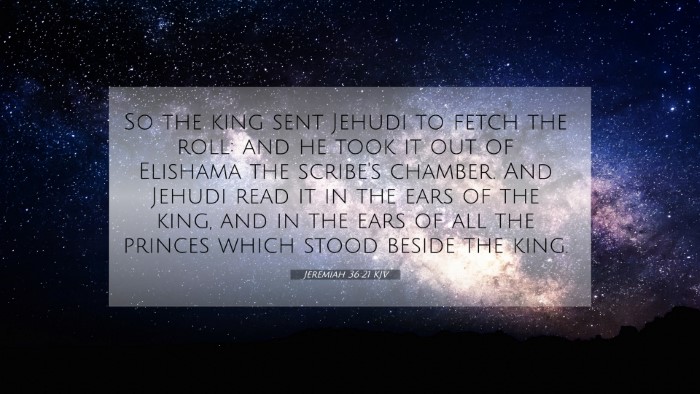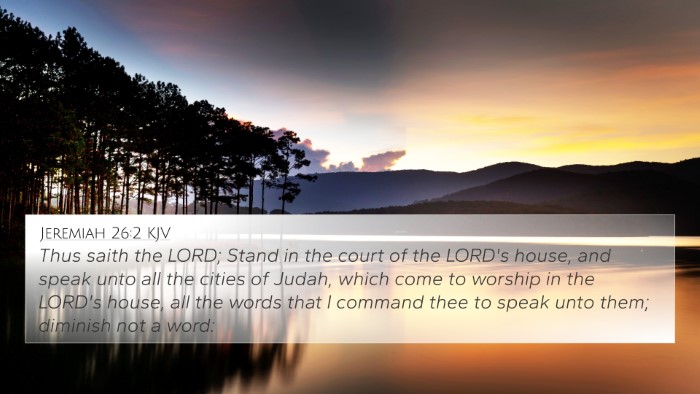Understanding Jeremiah 36:21
Verse: "So the king sent Jehudi to get the roll; and he took it out of the chamber of Elishama the scribe. And Jehudi read it in the ears of the king, and in the ears of all the princes which stood beside the king."
Verse Meaning and Context
Jeremiah 36:21 takes place during a critical moment in the history of Judah, when the king, Jehoiakim, was confronted with the words of the prophet Jeremiah. The passage illustrates the tension between divine messages and human authority, highlighting the royal response to the prophetic scroll containing Jeremiah's prophecies.
This passage serves as a reminder of the conflict that often arises when God's word challenges human authority. The act of sending for the scroll signifies both the king's acknowledgment of Jeremiah's authority and his profound reluctance to receive the message contained within it.
Commentary Insights
Matthew Henry's Commentary: Henry notes that the king's act of sending for the scroll reflects a need to engage with the divine message, even if it comes from a source he is not inclined to trust. His unwillingness to heed the message serves as a stark warning of the dangers of defiance against God's will.
Albert Barnes' Commentary: Barnes explains that Jehudi reading the scroll signifies a public acknowledgment of God's warning. The king's indifference to the content of the scroll exemplifies the moral decay of leadership in Judah, as the king prioritizes his desires over divine instructions.
Adam Clarke's Commentary: Clarke emphasizes the significance of the scribe's role in safeguarding divine messages. He suggests that the reading of the scroll can be seen as a moment of revelation, one that should provoke a serious reflection among the listeners regarding their spiritual state and responsibilities as leaders.
Thematic Connections
This verse connects to broader themes found throughout the Bible. It explores the relationship between scripture and authority, the importance of prophetic voices, and the response of human hearts to divine counsel.
Bible Verse Cross-References
To further explore the themes within Jeremiah 36:21, consider the following related scriptures:
- Jeremiah 1:17: God's call for Jeremiah to speak to the people, emphasizing the role of the prophet.
- Jeremiah 20:9: Jeremiah's struggle with his calling and the burden of God's word.
- Isaiah 30:9-11: A warning against stubborn hearts that reject divine truth.
- 2 Chronicles 36:15-16: The historical context of how leaders rejected God's messages and faced consequences.
- Romans 10:14: The necessity of proclaiming the message of Christ and how it relates to faith.
- 2 Timothy 3:16: The divine inspiration of all scripture and its authority over the believer's life.
- Acts 7:51: A reference to the resistance against God's messages, akin to the response seen in Jeremiah's time.
Conclusion
Jeremiah 36:21 serves as a poignant reflection on the conflict between human authority and divine revelation. As believers study this text, they can gain insights into the importance of recognizing and responding to the warnings and instructions found within Scripture. This verse, alongside its cross-references, enriches the understanding of prophetic authority and the necessity of being receptive to God's messages.
SEO Keywords:
- Bible verse cross-references
- Connections between Bible verses
- Linking Bible scriptures
- Comparative Bible verse analysis
- Bible verses that relate to each other
- Cross-referencing Biblical texts
- Thematic Bible verse connections
- Bible verse parallels
- Scriptural cross-referencing
- Inter-Biblical dialogue








